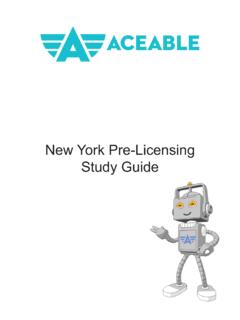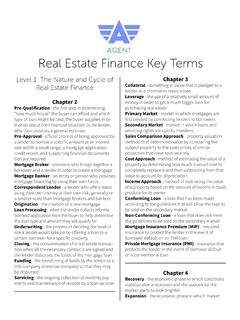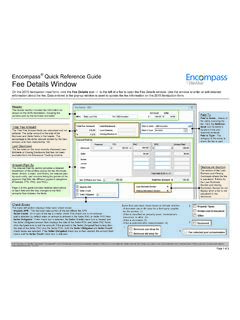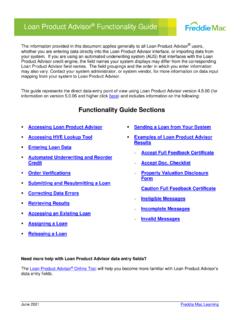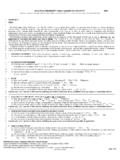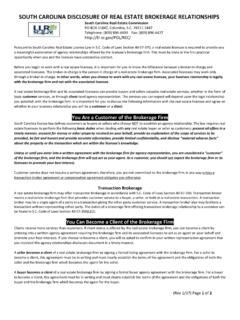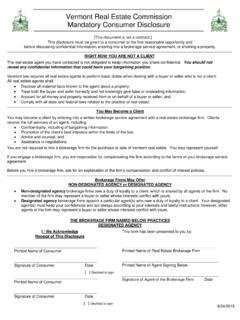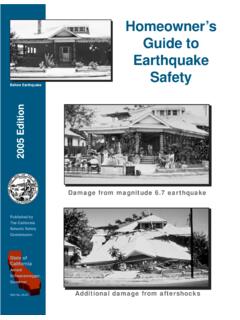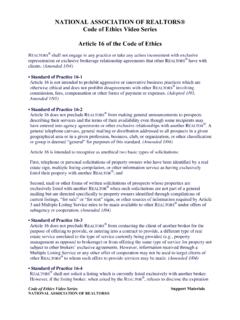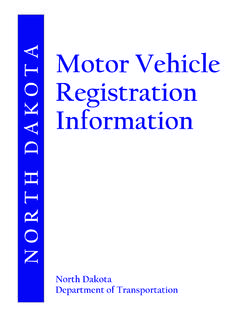Transcription of Florida Study Guide
1 Study GuideFlorida2 Table of ContentsOverview of the Real Estate Business 3 Real Estate License Law and Qualifications for Licensure 6 Real Estate License Law and Commission Rules 9 Legal Land Descriptions and Land Measurement 11 Real Estate Brokerage Activities and Procedures 15 Violations of License Law, Penalties, and Procedures 19 Contract Law Principles 23 Property Rights: Estates and Tenancies.
2 Condominiums, Cooperatives, Community Development Districts, Homeowner Associations and Timesharing 27 Contract Law Principles 28 Title, Deeds, and Ownership Restrictions 32 Legal Descriptions 37 Real Estate Contracts 40 Residential Mortgages 45 Types of Mortgages and Sources of Financing 51 Real Estate Related Computations and Closing of Transaction 55 The Real
3 Estate Markets and Analysis 57 Real Estate Appraisal 59 Real Estate Investments and Business Opportunity Brokerage 64 Taxes Affecting Real Estate 67 Planning, Zoning, and Environmental Hazards 723 Overview of the Real Estate BusinessObjectivesLevel Main IdeasLEVEL 1 Describe the various activities of real estate brokerage Distinguish among the five major sales specialties Identify the role of property managers Describe the appraisal process and the role of the appraiser Understand the mortgage process and the role of mortgage loan originator Explain the three phases of development and construction and distinguish between the three categories of residential construction Sales associates will be working in the real estate business doing a variety of activities, such as selling and leasing property, acting as a property manager, and providing counsel for clients and customers.
4 All of these activities will be done for a broker or brokerage. Property specializations are an effective way to obtain more clients and gather the niche knowledge needed for specific sales. Specializations could relate to many diverse topics, such as property type and client-type, or they might even relate to intangible assets and business opportunities. A property manager s main duty is to maximize the return on an owner s investment. Property manager s do this by wearing many hats, such as effectively marketing a property or maintaining positive tenant relationships. There are several valuation products available to both agents and their clients and customers: appraisals, CMAs, and BPOs. Appraisals are the most official of the three while BPOs are the least regulated. CMAs fall somewhere in the middle.
5 Land is often bought to be developed and constructed upon. Developers will need to go through several steps to develop land and once they do they ll have the option of building homes and other improvements. Residential constructions might include tract homes, spec homes, and custom homes. 4 Key TermsChapter 2: Introduction to the Real Estate Business and BrokerageLEVEL 1 Chapter 3: Sales, Leasing, and Counselingreal estate brokeragethe businesses of overseeing, consummating, and completing real estate transactions and business by bringing together the parties to a transactionbusiness opportunitya real estate transaction involving a business that already exists and includes both tangible and intangible assetsfarm area (target market)a specific area a real estate associate chooses to specialize and become an expert infollow-upthe contract a sales associate makes with a buyer or seller after closing a real estate transactionMLSa database which local member brokers share listings so other brokers can easily find buyers for those properties and establish compensation expectations for properties sold jointly (multiple listing service)
6 Special-purpose propertya property created with a special, and often limited, purpose in mindChapter 4: Property Managementabsentee ownera property owner who does not occupy the property and therefore often utilizes a property manager s servicesproperty managementthe vocation of renting or leasing someone else s real property on their behalf in exchange for compensation and in accordance with a property management employee contract5 Key TermsLEVEL 1 Chapter 5: Financing and ValueChapter 6: Development and Constructionappraisalan official valuation of a property s valueappraiseran individual who is trained and licensed to perform appraisals, or officially estimate the value of real propertyUSPAPan agency charged with overseeing, regulating, and promulgating real estate appraisals and appraisal practices (Uniform Standards of Professional Appraisal Practice)broker price opinion (BPO)a broker s opinion of the value of a piece of real property, given in writingcomparative market analysis (CMA)a report that compares the prices of recently sold or listed homes ( comparables ) in order to estimate the market value of a similar property (the subject property )
7 Located in the same areasubdivision plat mapthe proposed map of a to-be-developed subdivision indicating proposed lots, streets, and other important organizational information, created according to the layout of the existing parcel of real propertydedicationa gift of land to the government for public use, gifted by the property owner6 Real Estate License Law and Qualifications for LicensureObjectivesLevel Main IdeasLEVEL 2 Explain the purpose of Florida real estate licensing law and demonstrate an understanding of its basic provisions Describe both the activities requiring a license, and exemptions to this requirement Describe the types of licensure regulated by the state as well as requirements for obtaining and maintaining a license, including eligibility, education, renewal requirements, and mutual recognition There are several important laws that govern real estate in Florida : Florida Statute Chapters 20, 120, 455, and most especially 475.
8 From the law set out in 475, the FREC created regulations for license holders, which lives in Chapter 61J2 of the Florida Administrative Code. The three types of real estate licenses available in Florida are sales associate, broker associate, and broker. Sales associates and broker associates must be supervised by a broker. Real estate activities in Florida include negotiating, appraising, selling, auctioning, leasing, buying, renting, advertising real estate activities, closing on a property or business, or exchanging properties. A license is required to do any of these activities with real property or businesses in Florida . You learned the procedure and prerequisites for applying for a broker license and sales associate license, and the rules for registering those licenses. You also learned the exemptions to the licensing prerequisites and the fee waivers available.
9 Mutual recognition is a contract recognizing the real estate education of another state. It allows a license holder in that state to skip the pre-licensing education requirement and national portion of the exam. Reciprocity, in contrast, only requires a license holder from another state to pass a background check. Reciprocity is only available to active/recent military personnel and their spouses. Florida requires post-licensing education before a first renewal (45 hours for sales associates, 60 for brokers). Every subsequent renewal has a 14 hour CE TermsLEVEL 2 Chapter 1: Florida s Real Estate Lawscaveat emptorthe concept that a buyer is responsible for verifying the quality and value of the goods prior to the purchaseChapter 2: License Requirements and Exemptionsbrokera person of business entity who is licensed to represent one of the parties in a real estate transaction in exchange for a commission or other valuable considerationsales associatea real estate license holder who is associated with a licensed broker for the purpose of performing real estate brokerage acts on the broker s behalfcompensationany valuable consideration directly or indirectly paid or promised, expressly or impliedlyreal estate servicesbuying, selling, leasing, renting, auctioning, appraising, exchanging, negotiating for, or closing on real property or a business for compensation.
10 Advertising that you will do any of the aforementionedChapter 3: Obtaining and Maintaining a LicenseFlorida residenta person who has resided (regardless of whether the place or base of residence is a recreational vehicle, hotel, rental unit, or any other temporary or permanent situs) in Florida , continuously for a period of 4 calendar months or more, within the preceding one yearprima facie evidenceevidence that in and of itself is sufficient to prove a factlicensea license is granted when an applicant passes the state exam8 Key TermsLEVEL 2 Chapter 3: Obtaining and Maintaining a License (continued)registrationregistration is the process of submitting information to the DBPR adjudication withheldwhen a court stays the imposition of a sentence and instead puts the defendant on probationnolo contendere (no contest)





